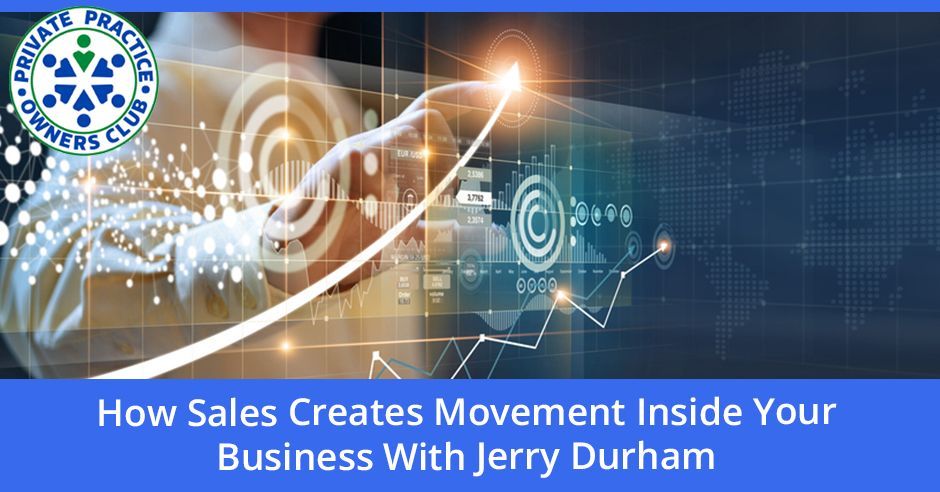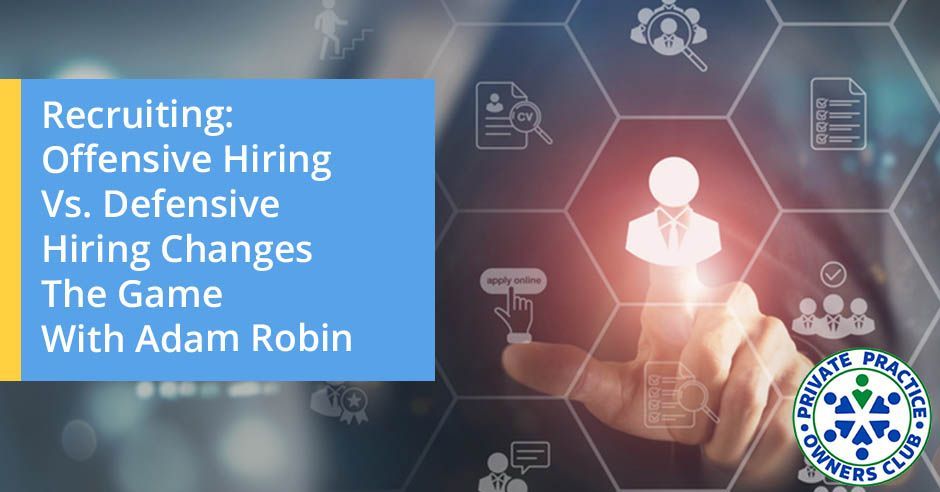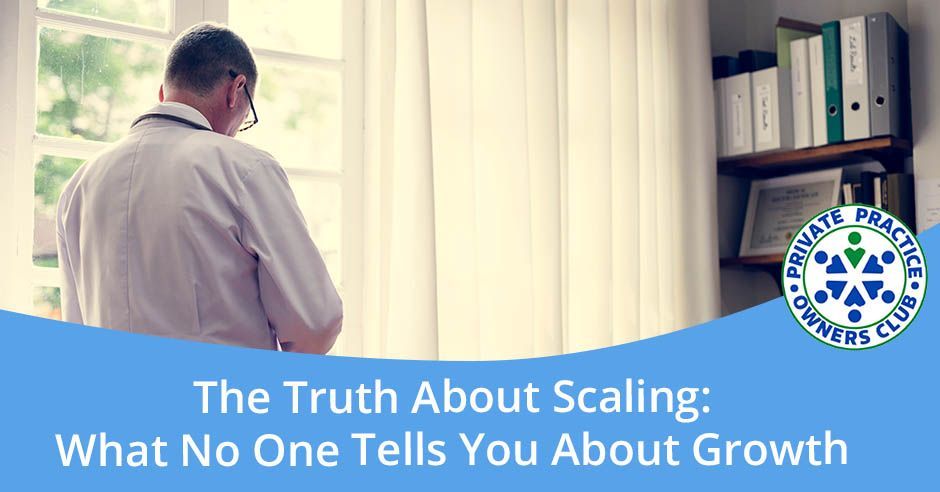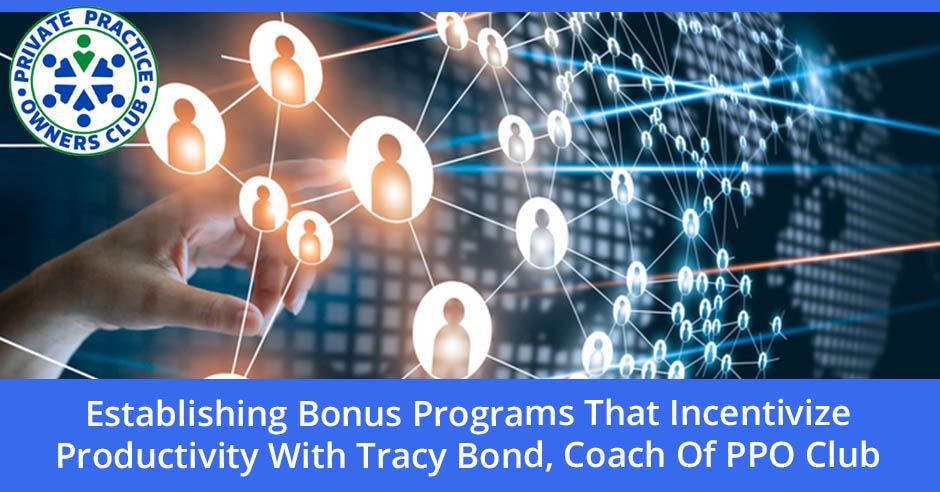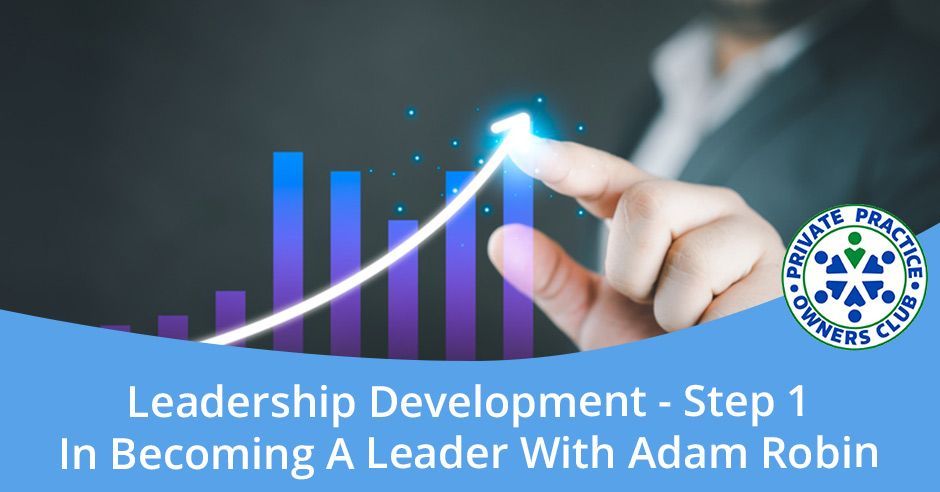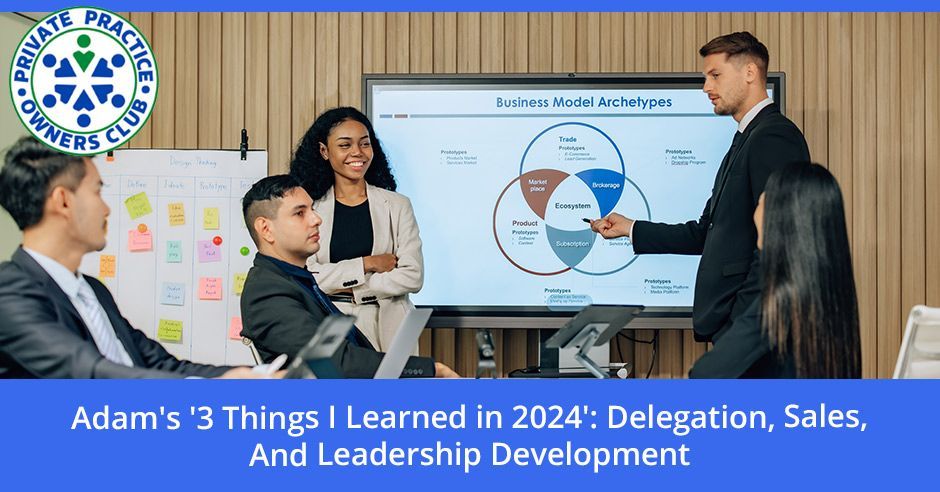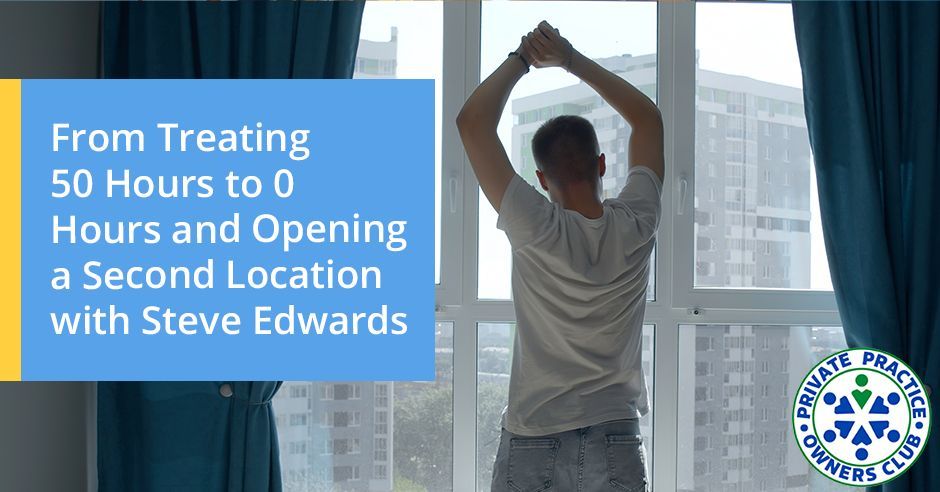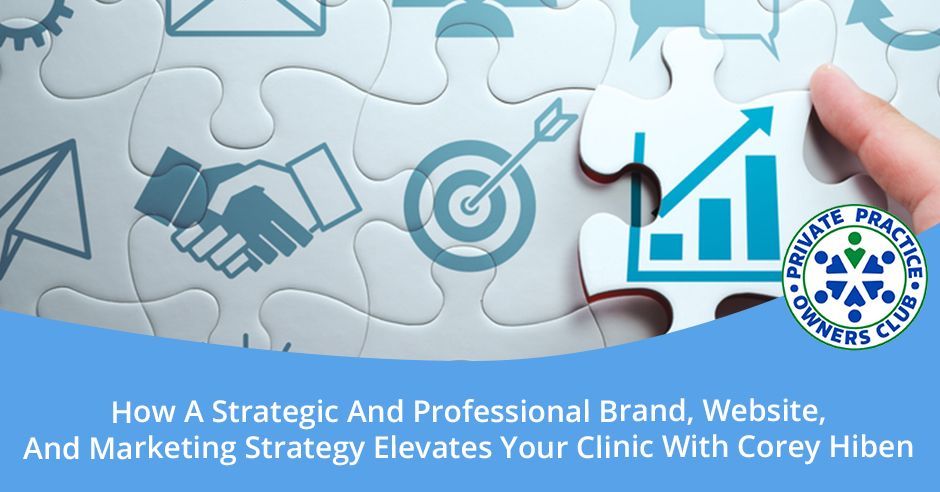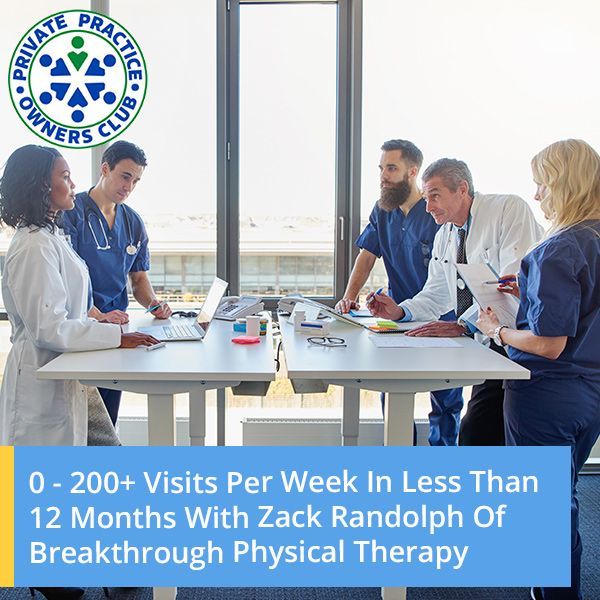Struggling to break through the revenue ceiling in your private practice? What if 𝘆𝗼𝘂 𝗰𝗼𝘂𝗹𝗱 𝘂𝘀𝗲 𝘀𝗮𝗹𝗲𝘀 𝗻𝗼𝘁 𝗷𝘂𝘀𝘁 𝘁𝗼 𝗯𝗼𝗼𝘀𝘁 𝗽𝗿𝗼𝗳𝗶𝘁𝘀, but 𝘁𝗼 𝗰𝗿𝗲𝗮𝘁𝗲 𝗺𝗼𝗺𝗲𝗻𝘁𝘂𝗺 𝘁𝗵𝗮𝘁 𝗱𝗿𝗶𝘃𝗲𝘀 𝘆𝗼𝘂𝗿 𝗲𝗻𝘁𝗶𝗿𝗲 𝗣𝗿𝗮𝗰𝘁𝗶𝗰𝗲 𝗳𝗼𝗿𝘄𝗮𝗿𝗱?
In this powerful episode, Adam and Jerry dive deep into how mastering sales can transform your private practice into a thriving, predictable, and profitable Practice. You’ll discover why sales isn’t just about closing deals— 𝗶𝘁’𝘀 𝗮𝗯𝗼𝘂𝘁 𝗰𝗿𝗲𝗮𝘁𝗶𝗻𝗴 𝗺𝗼𝘃𝗲𝗺𝗲𝗻𝘁, 𝗰𝗼𝗻𝘀𝗶𝘀𝘁𝗲𝗻𝗰𝘆, 𝗮𝗻𝗱 𝗶𝗺𝗽𝗮𝗰𝘁.
Whether you’re a seasoned practice owner or just starting out, you’ll learn practical strategies to implement immediately. Get ready to redefine the way you think about sales and unlock new growth opportunities for your practice.
Tune in and Learn:
• 𝗦𝗮𝗹𝗲𝘀 𝗶𝘀 𝘁𝗵𝗲 𝗲𝗻𝗴𝗶𝗻𝗲 𝗼𝗳 𝗣𝗿𝗮𝗰𝘁𝗶𝗰𝗲 𝗴𝗿𝗼𝘄𝘁𝗵 – Without consistent sales, your practice will struggle with stagnation and unpredictability.
• 𝗕𝘂𝗶𝗹𝗱𝗶𝗻𝗴 𝘁𝗿𝘂𝘀𝘁 𝗱𝗿𝗶𝘃𝗲𝘀 𝗵𝗶𝗴𝗵𝗲𝗿 𝗰𝗼𝗻𝘃𝗲𝗿𝘀𝗶𝗼𝗻𝘀 – The key to successful sales is establishing genuine trust with potential clients, making it easier to close deals.
• 𝗖𝗼𝗻𝘀𝗶𝘀𝘁𝗲𝗻𝗰𝘆 𝗰𝗿𝗲𝗮𝘁𝗲𝘀 𝗺𝗼𝗺𝗲𝗻𝘁𝘂𝗺 – Regular, repeatable sales systems fuel long-term growth and stability.
• 𝗬𝗼𝘂𝗿 𝗼𝗳𝗳𝗲𝗿 𝗺𝘂𝘀𝘁 𝘀𝗼𝗹𝘃𝗲 𝗮 𝗰𝗹𝗲𝗮𝗿 𝗽𝗮𝗶𝗻 𝗽𝗼𝗶𝗻𝘁 – Practices that tailor their services to directly address client challenges win more Practice.
• 𝗦𝗰𝗮𝗹𝗶𝗻𝗴 𝘀𝗮𝗹𝗲𝘀 𝗿𝗲𝗾𝘂𝗶𝗿𝗲𝘀 𝗹𝗲𝗮𝗱𝗲𝗿𝘀𝗵𝗶𝗽, 𝗻𝗼𝘁 𝗷𝘂𝘀𝘁 𝘁𝗮𝗰𝘁𝗶𝗰𝘀 – True growth comes from building a team that sells effectively, not relying solely on the owner’s efforts.
If you’re ready to turn sales into a growth engine for your private practice, this episode is a must-listen. Learn how to create a system that generates steady leads, closes more deals, and builds unstoppable momentum.
𝗩𝗶𝘀𝗶𝘁 𝗼𝘂𝗿 𝗟𝗶𝗻𝗸𝘁𝗿𝗲𝗲 for Coaching Services, a Free KPI Dashboard, our Facebook Group, and Annual Strategic Planning Services:
https://go.ppoclub.com/linktree-podcasts
𝗟𝗼𝘃𝗲 𝘁𝗵𝗲 𝘀𝗵𝗼𝘄? Subscribe, rate, review, and share!
https://ppoclub.com
---
Listen to the Podcast here
How Sales Creates Movement Inside Your Business With Jerry Durham
Welcome to the show. We're going to talk about sales. Let me tell you why this is exciting to me. I get to meet and hang out with a guy that I looked up to, still look up to, but like was super inspirational for me as even as a PT student. I'm sure you've seen this guy around all over social media. His name's Jerry Durham. He's the founder of the
Client Experience. A former practice owner in the Philly area. The guy is just making a splash in the industry. I just wanted to, like, bring him on to talk about sales. Jerry, what's up?
I appreciate the invite. Of course, it was funny. I clicked on it so fast. I forgot I scheduled and then scheduled two when I went back. That's how excited I was to be here. Adam had me on here twice that's why I wanted to make sure I was scheduled. What's up, man? I'll tell you what. I'm going to say I've been having this conversation around sales for about, I'm going to say, I'm going to lowball it and say fifteen years, and it's finally gaining traction.
Literally like the last year. It's nice to talk to people who've been in it a little shorter, but doing work, and it's like, “Yeah, sales.” I'm like, “Cool.” All I want to know is everybody's talking about it. That's it. I don't want to own sales, dude. It's not something I want to own because everybody should be doing it. What I found was early on is, I just released a podcast, whenever anybody listens to it. If you go to my podcast page even when this releases, look for the episode with Biagio Mazza.
There are other PTs out there doing sales work. We just did like almost 2 to 2 1/2 hours. I did a two-part podcast with him. He puts it out there, and he did a very good job describing this. I want to give him a shout out because he talks about cells and physical therapy are basically the same thing. He breaks it down. I cannot break it down like he did.
I'm not just trying to get you back to my podcast, but the idea is he's like, “Look, we're all in this. We're all in the sales profession.” He breaks it down into five steps. The sooner we realize that, the sooner we start to take a bigger view of the business and get out of our provider hats and get out of our provider egos. Talked a lot about that this past week. We just start to embrace all the things we need to embrace to be successful doing what we do.
Let's face it, we are all doing a great thing. We are providing services to people in our community who need our help. You cannot argue with it. We're not selling freaking Bitcoin here. We're not selling a magic potion, man. We're selling something that people need and can benefit. We all know it can benefit society as a whole. The sooner we embrace its cells is a big part of this. How does it fit here is the more successful we will all be because the professional thrive too. Here's my philosophical version of what's going on and how I look at cells in physical therapy.
Nathan and I, went to New York last week. I saw that. It was cool, man. Our first time there, just blown a load. I’m going back.
I love it.
It was awesome.
That city will eat me alive.
We had about twelve practice owners there, and we talked about sales a little bit. We talked about finance, and I asked them, “How many of you have ever had any sales training at all?” Not a single hand.
I'm going to say this. I didn't do any official sales training until about 3 or 4 years ago. I read every sales book. I knew salespeople, so I'm going to say official training, not till about three years ago. There was this whole journey of figuring out what training did I want. What you learn and what I learned over time, and what I like coming in blind going, “I just kept buying sales books.” There's a group. There's a handful of really solid salespeople out there that we all see. When you go into the sales literature, there's about 6 or 7 people, and I read all their stuff.
What was cool was I didn't really know what I was looking for, but what I was trying to do was draw the commonality. I'm like, “All these people are successful. They're talking about something different.” I tried to go a level down and go, “What are they all doing the same?” That's what I took out and started building this foundation and then decided, “I want to put this process on top of that foundation.” That's when I did the sales training. Dude, I bet if you would ask those same owners, how many of you read a sales book? I would assume at least a couple of hands would have went up.
I would think so. I would hope so.
That's the cool thing about. I don't know if I said this to you before we hit record or after, but more people are going, “Yeah, sales.” I'm like, “Cool. That's a win, man.” That’s a win, right?
Yeah. To me, I get sold on sales more every year. More and more. I've got a couple of buddies of mine who own practices who were doing, I'm just like blown away at what they're doing. I'm trying to figure out like, these guys just have this swagger about them. I'm trying to figure it out, and it hit me, and I'm like, “They know how to sell. They're just great at articulating how they serve people.”
It all came together. Once I embraced sales, I started recognizing that everything had changed for me. Like patient experience went through the roof, employee experience went through the roof and employee retention. The way I was communicating with physicians and referral partners went through the roof. Even the way I was leading my family changed. Everything changed. I started identifying things like, “Sales is the thing that creates movement in the organization.” It's the tool of creating transaction, like a change or decision.
You got it. I agree with that.
Without it, we're not moving. There's no moving and shaking going on.
Figuring Out Your Sales Process
People need to hear what you just said on that. Without sales, there's little to no movement in your business flow. Let's call it the flow of your business. It took me forever to learn that. I'm going to throw this out because I'm going to prove your point. Take what Adam just said. What do we all do right off the bat? We go spend all that money on marketing.
Without sales, there is little to no movement in your business flow.
On marketing, I know.
I tell everybody, take a deep breath because, and here's my challenge to everybody, to prove your point, figure out your sales process first.
I agree.
You build out that sales process and understand where it fits in this. Your marketing will become insanely more valuable.
Way better.
You'll get a bigger ROI. All I'm saying is don't spend $10,000 a month until you get your sales process together, and then go spend. I'm not telling you to spend more or less on marketing. I'm saying build out the sales process. I think I just did a short the other day that I posted. I was like, if you want the best marketing program, it has an awesome sales process built in right behind it. I always tell people. Here we go. Let me give real-life examples, Adam.
What I love is some of your people are going to hear this and go, “That's me.” This is what I want them to do. Pause before you want to blame your marketing and prove it to yourself. We just did. Here's the deal. I get this all the time. People call me, “Jerry, spending all this money on Facebook ads with so-and-so and they s***.” I'm like, “They may. Can I ask you a couple of questions?” I'm like, “Tell me what's been going on.”
“We did this whole program, and we didn't get any new patients out of it.” I'm like, “What? That's not the goal of marketing. The goal of marketing is to get you quality leads that then yourself over and turns into new patients.” I said, “I'm just going to challenge you on this. Maybe your marketing doesn't s*** in. This is one of my favorite analogies ever, and I got a couple of YouTube videos on this. It's marketing and sales. I said they're two separate people sharing an apartment, and they never leave the apartment. That's how close together they work. They're working so close, but they're two separate people. Everybody says marketing and sales, and they say it's so fast.
They make it one thing, but it's not.
One thing. I'm like, “No.” I'm going to challenge people. I was going through this in my head. I'm like, “Your salespeople should not be doing your marketing, and your marketing people should not be doing your sales.” Yet, they should work so close together. No, they don't meet once a week or once a month. They are meeting every day. I want them communicating every day. At the end of the day, I want the sales team to send a feedback form to a lead tracker feedback to the marketing team.
We had 30 leads, ten came from this source, ten came from this source, five came from this source, and five came to this source. I want the marketing team to see that feedback every brick and day. Your $1 you spend on marketing, your team is already halfway through the month going, “We're right because you got to plan together.” You got a quarterly plan. I'm not saying you do this monthly because you've got a quarterly plan, but your marketing team should know about halfway through the month where the marketing spend is going to be next month. Where are we going to get this ROI?
Based on the feedback from the sales team.
You got it based on the feedback from the sales team on the lead tracker. By the way, I'll give you my lead tracker. You can share it with your people. It has a place. People are going to look at it and go, “Is this what he shared with you?” You're going to go, “Yeah.” Everybody overcomplicates this. They overcomplicate this. It's a sales tool. They turn it into a marketing sales retail. I'm like, “It is a sales tool. Don't make it anything else. I'll share it with you.”
By the way, it'll work with any clinic. It doesn't matter the payer model. None of this matters, pay or model, by the way, probably should have said that from the beginning. If I give feedback to the team, they know where to spend that dollar so we can get a bigger ROI. Let me give you another example of this. I learned this the hard way. Anything I share with you all, I effed it up longer than you've probably been alive in my own business until I finally figured it out. If you're not tracking leads, you're flying blind on the marketing.
I love this example again, this Facebook thing. “We didn't get any new patients.” “Will you track leads?” “Yeah.” “How many Facebook leads did you get from it?” “Thirty.” I'm like, “You struck out 30 times.” I’m like, “Yeah.” I'm like, “That Facebook ad did a nice job.” Let's talk about the quality of leads. Let's talk about that. We can only talk about the quality of leads in your conversion rate. If your sales process is dialed in, you're delivering it one percent of the time. The importance of this middle face, let's double back, you saying the business does not move without a sales process.
This is the prime example. “We're spending money on Facebook leads. We're out in the community. We're doing this. We're doing that. We just don't have enough new patients. We got to double down on marketing.” “No, we got to fire these marketing people. Get new marketing people.” I'm like, it's so silly though, but it's like, it's the same. I did it forever. I did, too. Here, check this out. This happened this week. I love what's on today because this literally happened this week. My head now, like you said, everything is about sales anymore.
I'm always tracking. How am I being sold? The best thing, I love listening to sales guys, they walk in. I was watching a great YouTube the other day a great sales guy. He was like, “I'm just getting sold, and I'm buying it, and I'm going forward with it. I know I'm being sold.” It's like, “I'm buying this product.” That's what you do. I was sitting in one of my favorite restaurants in Philly at a fire two years ago. It's a Mexican restaurant. They reopened this week. My wife's working downstairs. I'm working upstairs. I look at my phone, she sent me an Instagram message, and it's Tequilas.
It's called nice Mexican restaurant. Really good food. Been around forever. It's Tequilas back open tonight. She sent me a note. “What time are you done?” I'm like, “Five.” She goes, “So am I.” I'm like, “I'll get changed in between my calls.” We go down, we sit at the bar and the cool thing was tequilas. They have all this tequila, and over here they had all kinds of liquor. My wife and I got in a conversation about her work, and I was talking about a phone call I'd had earlier in the day and I kept telling this guy, “I'm not a marketing guy. If you're looking for marketing or branding, I'm not your guy. I can help you.” I said the same thing.
“Once your marketing works, I can help build out the sales process. I can help build out the pathways. I can do all this with you, but I'm not a marketing guy." I'd had that conversation earlier. My wife and I were sitting there, and I went, “Do you know the cool thing about being a sales guy?” Of course, I'm a sales guy. I said, “The cool thing about being a sales guy is if I was in marketing, there was a bottle of Aperol. If I was in marketing, I'd have to build a whole marketing program around that Apero,l and then I have to get good at selling that.”
I go, “That bottle of tequila, I'd have to build a whole nother marketing program around that.” I kept going around, and I said, “You know what's cool? In sales, I can back up and go, I can sell all this.” With the same process, by the way. You bring me the marketing, you bring me your target. You bring me your customers. I can sell all of this to anybody on any given day. If I know who your leads are, again, marketing and sales. What's cool is the sales guy can sell any of that s***. That whole thing, and I went through it, nobody can sell as well as me.
I'm like, “Are you sitting down? Take a deep breath. I got a million people that can sell better than you and grow your business way more quickly and way more efficiently if you'll give that up.” It's the last thing we all give up answering the phone. The day we give up answering the phone for leads is the day we're all like, “I'm going to die.” It's like we s*** the oxygen out of everybody. I'm going to tell you, I created a company, a virtual front desk sales company, and I got 22-year-olds who are doing a fine job selling both in network, out of network, all of it.
The day you give up answering the phone for leads is the day your business dies.
They're professionals, I bet.
They've been on the phone. They know the process. They know the foundations of it. By the way, before you ask, because everybody's thinking this, the majority do not come from healthcare.
Why Most People Get Sales Wrong
What do you think? Why do we get this wrong, you think? I guess it really just depends on, maybe it's not right or wrong, but like in your mind, why do you think the owners get this idea of like marketing is my answer. More new patients is my answer. Why do we get this wrong?
Here's my take on it. I think it's simple, Adam. I do. I think it's about the foundations of a business. I think this thing. I posted all the time still marketing, sales, retention, referral, repeat. You have to. It's almost so simple when you look at it, and you're like, “That's good.” You blow it off, and I'm like, “No, it's this. Read it. You can learn it and burn it in your brain because this is what everything is.” Let me give you an example of this. Again, I had a business for eighteen years before I realized this. Here, let's do this. A drop-off mid course of care.
I spent years just yelling straight at my provider. It's your fault. You got to get your drop-offs out. As soon as I learned that flow and I learned about the connectedness of marketing to sales to retention to referral, I realized we had a drop-off, which I then, instead of going, “Adam, you got to fix that,” I went, “I wonder if the process was followed. The process of starting where your marketing and the bet.” I go straight to the sales sheet because I can then look at the cell sheet to see who's the salesperson is a person who took the call. I can also look at the source.
I go straight to the cell sheet to figure out, “What marketing? Where do they come from? How'd they find out about us? It came from a provider we treat.” We see a lot. I go straight up, and I go, “What’s the sales process followed?” That's a yes or no. If it wasn't, we're dead in the water. We're done. There's no yelling at anybody downstream. That was the impact on my business, Adam, of that diagram. The day I did that, it gave me the freedom to quit being a firefighter. I heard another entrepreneur use that. I like this idea. I say this all the time.
“Jerry, Adam calls me. I'm just going to use you because you're here. Jerry, I need your help managing my cancels. This is another call I get.” I go, “Cool, Adam, I can help you manage cancels, but would you rather manage them or prevent them? Preventing the cancels happens further upstream. Managing. I'll teach you how to reschedule.” We take a little too much pride in our reschedules, my friend, because if the phone rings, and I make my clients, there is no gray with cancels. If the phone rings and Adam says, “I need to cancel,” even if he reschedules this week, it gets categorized as a cancel that rescheduled.
It is still a cancel and goes down in the cancel category because we lost that slot. My goal is you to get into a slot. By the way, I budget in cancel. 5% to 8%. The thing is, I want my sales process should be moving you along the process. Part of the sales conversation is selling the plan of care and getting agreement upon the plan of care. Execution of that plan of care means we've had a heart-to-heart at him, and you're in the slots, and you're in the days when you can make it. By the way, that's some of the hardest things I had my providers do.
I'm like, “They rescheduled twice. Have a conversation with them. Why are they rescheduling their slots all the time?” I was like, “I get caught up in the reschedule.” I'm like, “This isn't acceptable.” By the way, that's on you so have a conversation. “Adam, you committed to this plan of care. Adam, I want to make sure you're getting the best time. Adam, what's up?” We find out like your kid's on a different school schedule. I'm like, “Cool, Adam.” This is how I'm going to say, “I want you to prioritize your kid. With that said, let's find a better slot. Once your kid's taken care of and you're not double booked to these places, when can you make this a priority?”
Boom, the cancel/reschedule calls stop. That was part of the sales process. I'm going back again that, “Do you want to manage a cancel or do you want to prevent it?” We prevented it upstream. By the way, we sold it. Adam did sell it properly. Now, Adam is taking ownership of this and going, “You've rescheduled twice. What are we going to do?” I love this Harry Potter line, mischief managed. I'm not a big Harry Potter fan, but I love that phrase, mischief managed. We're done.
Think this is a Harry Potter mug I got for you.
There you go. Mischief managed. The cancel call is gone. Jerry, who used to reschedule at least once a week on Adam's schedule. Now, one call is gone, but now everybody's doing it. Now we got 5, 10, 15, or 20 calls a week are gone. I call that the downstream chaos. This sales process cleans up, prevents, and eliminates downstream chaos. If the phone rings, that is chaos. I have some of my clients tracking cancel calls. That's all I want to know how many cancel calls this week. I don't even give a sh** the result. I think I jumped ahead a little bit there.
What you just made me think about is like there are two sales conversations. Maybe there's more.
Yes, you are correct.
There's the initial eval, but then there's the get them scheduled. That's an enrollment conversation.
You got it. Yeah. Thanks for asking that. You were saying something earlier, and I wanted to bring this up. Here's the other huge tipping point. Tipping point number one was going, “This is a business. It's a marketing, and it sells its retention.” Now, did I know what to do with it? Absolutely not. There was a big, I call it the two-by-four upside the head. Nothing less than getting bashed upside the head going, “What have you been doing?”
One of the other big tipping points in this journey was going, “We have three sales phases.” This is to answer your question. We have three sales phases. All of our clients go through it. I don't care your payment model. Sales phase number one, pre-arrival process, front desk. Front desk sales. Which can be, by the way, that sales process can be weeks. I talked to you, “Adam, you're not scheduled until 7 days out, 10 days out.” “Sure.”
“You better have a process to keep in touch with Adam.” That process could be 24 hours. That could be weeks. Sales process number two is the shortest one of all. It's a valve. It's agreed-upon plan of care. When that person walks in, when their provider and/or a person greets them to take them back to the room for the evaluation or to take them back to the gym for the evaluation, that's when the second sales cycle starts. The objective of that is, yes, what you just asked, an agreed upon plan of care. Phase three of the sales process is the completed course of care.
That's cool.
If you look at that, it makes it easier. I'm going to tell you what, it makes it easier to create a sales process that's connected. The goal of the sales process of phase number one is to set the provider up for success. Reverse engineer, how do you create success for the provider during sales phase number two? There's like 3, 4, or 5 things we have to do. Guess what we do in sales phase number one? We bake that all in to make, she set up for that. It's simple. If it was hard, I wouldn't be here, my friends.
I'm sure you're going to say it's all of the above.
Maybe not.
Jerry Durham’s Sales Outline For PTs
It sounds like there are really two main components that are sticking out in my head. One is like the language that we use to communicate during these touch points. We want to create emotional buy-in, however your process is, but then there's the tracking piece. There's the metric piece. Where do you see in your mind, when you're going into a practice, I'm assuming like, do you start with the metrics or do you start with the language? Where do you go first?
That's what I was working on. It's my outline for how I engage clients to want to do this work. That's what I was doing. I was sending them the outline of just this, Adam. Let's do this, my friends. Let's make this really simple. It's a PT of our, my friend, the process. We have to have a current state. I cannot make goals. You tell me. You're on my schedule, Adam. I'm a PT, I'm a provider. You're on my schedule, and you tell the front desk team you want to return to the gym to deadlift five days a week, pain-free, low back pain.
This is at the pre-arrival?
Yeah. I walk into the room as a PT. “Jerry the PT walks in with Adam.” In order to set up a plan, a journey back to the gym, pain-free to deadlift, I have to do what? Measure your current state. I say, “Adam, this is our goal.” I'd measure the current state. When I go into a business, now I'm going to answer your question, because the question is, I manage it like a PT about. I got to go in, and we got to figure out your current state.
Everything we just talked about, we're going to sit down. I invite the owners, and then I say, “Anybody else involved in the pre-arrival process? I want a clinic manager there. I want at least one front desk person there.” If all those people aren't there, the owner ain't going to tell you the whole process. They don't know what's going on. The front desk will know. I've been on calls where the owner are like, “We do this.” You see the front desk person.
“No, we don't.”
I'm like, guess what the right answer is.
That's what it's time to exit the ads.
I sit down with them, and we go through where do all of your leads come from. I want to know every source. Web form, word of mouth, community events, and doctor referrals. We do Facebook ads. We do blah, blah. I want it all. Now, who follows up with each of these? Where does it go? What happens next? I make them go through every step. For these leads, where they get managed, they go through an email. You guys get an email, and you do an outbound call.
That's all I want because the early next. It's like range of motion, but then we go deeper and deeper. Once we see, “Free and clear, I'll do some overpressure.” If it's limited, now we go looking at all kinds of stuff. The first level is just to get that. I go, “You get on the phone.” What happens when you hang up? Email, phone call, text, what do you do? After that, what do you do next? You collected their insurance information. Where does that go?
What's the promise? When are you going to get them this information? We break it down. I make them give me every fricking step from, I call it the person raising their hand. That's when the phone rings. They fill out the web form. They click on your Facebook ad. That's someone raising their hand saying, “I'm interested in you.” We do the whole breakdown. That's the current state. I don't go really into the conversation yet. I go into the tactical part of it. I want to see every step.
You want to see the, you want to zoom out and see the model like how it's all.
Once we have that, my goal is to go, “What do you want it to look like, Adam?” That's what I do. Everybody's like, “Just come in and tell me.” I'm like, “Hold up. You got to tell me what you want.” What experience do you want to create for these people? The big one, I always catch people on. When do you want to give them their cost? Everybody's like, “I don't know.” I'm like, “When's the last time you bought something without knowing what the effing cost was before you brought it to the register?” I'm like, “When do you want to give them their cost?” Some people are like, “We give them their cost when they arrive.” I'm like, “Does it work?” I'm going to make you hold you accountable for your current process. If you tell me it works, why would I change it?
Now we'll keep it there. I get it because each market's going to be a little different.
The active process. I don't want to mess with it. Now you may go, “We give it to people when they arrive, and I think it works.” I'm like, “Why do you think it wouldn't?” That's all of a sudden, by the way, that's why the front desk has to be in their room. The front desk goes, “No. We have 2 or 3 people that walk out a week.” The owner goes, “We do.” That's where you go, “I put a big fricking circle around that.” We know this. We know this is a leakage point, a leaky bucket, because that's what I'm looking for. I'm looking for the leak.
You start from scratch, man. You'll be on the bottom.
We go there, and that's why I won't just do the call with the owners. I'm like, “You got to bring one person on tape managing this stuff.” That's what I do. We start sinking in, and then we have to agree upon what the new process looks like. I start training the front desk on the conversation
Building A Healthy Workplace Culture
That's awesome. That's pretty cool, man. I like it. I see how even me and my clinics I could benefit from that type of work. My sales process is pretty good, but I can say for me, like whenever I really took ownership of the patient experience and I was like, “I'm going to go through every single touch point and I'm going to be accountable for every single piece of communication that goes through. I want to be able to feel what the patient feels. I want to understand how they will respond emotionally to all of these communication channels.” That was worth more than ever any Facebook ad I ever ran. Patients just multiplied. New patients just multiplied. Also, providers and my team felt empowered. A hundred percent, the culture just thrive.
This is why I'm going hard. The culture I'm like, “Look, this burnout stuff, I get it. It's multifactorial, yet we cannot do all this downstream stuff until we set up a process that sets everybody up. You've got to create success here. We cannot have pizza parties and do all this if you're just putting people in a churn and burn atmosphere.” That means patients and providers. You cannot separate. I butt heads with some people on this because I say the focus on day one has to be that person you serve so you can bring the right people in to serve them.
Everybody's like, “Employees first.” I'm like, “You got to bear with me on this. It becomes a virtuous cycle where you cannot separate. A happy patient makes happy providers who make happy patients who make happy providers who make happy patients.” I go, “After the fly will get spinning. No, you cannot separate it. It's not one or the other.” Early on, you have to go a step at a time. I'm going to hire all these people. I'm like, “You don't hire people without knowing who you're going to serve in what manner.”
You do not hire people without knowing who you are going to serve in a particular manner.
You cannot say it was employees first. I know it sounds like I'm getting a little nitpicky and in the weeds, but I'm like, you've got to know who you're serving. Let's face it, my friend, if you're treating a bunch of athletes, let's just say crossfitters, you're not going to hire the same staff as if you're treating female pelvic health all day. It's that simple. “That's a different example.” I'm like, “No, it's not.” How are you going to be employee-focused until who you're serving? it does start with the person you're serving and the patient.
By the way, you're better sit. If I hire Adam and I go, “I need you to come in and serve all these people. I have no idea who you're going to serve, but I got this great process for you.” Adam's going to go, “Thanks, Jerry. That was fun.” Not sure who's going to show up. You're going to leave and go, “Thanks, Jerry. Appreciate the conversation. I'll call you. Don't call me.” I'm like, “Let's bring it up further.” If I can sit down with Adam and I go, “Adam, by the way, why don't you take a look at this? This is a patient's journey.” What's the name of your business, Adam?
Southern Physical Therapy.
“Adam, I want you to take a look at this.” Before we start the interview, Adam, you do your introductions and everything, and Adam's looking for a new job. He's a PT, PT assistant. He's looking for a job. We do our introductions. I say, “Adam, here's the first thing I want to do before we start talking. I want you to see what a patient's journey looks like here at Southern Physical Therapy. What I want you to understand from this is that we understand every touch point our potential patients make, because pre-arrival is potential paying customers, make with our company all the way through.
Please note, an end of course of care is not a discharge. We call it a complete course of care because we value our clients, and we value keeping them healthy. What you're looking at, Adam, is a circle.” I say, “Take a look at that, Adam.” I go, “Please note a couple things here. Is A, it's a circle. B, please note the red color. That's the front desk team. Look at how many touch points and look at how valuable they are in setting you up for success here at Southern Physical Therapy.” Already you're going, “This is different.” You're not saying it out loud, but you're like, “I'm listening.” I'm like, “This is a fricking interview.”
It's the product. I tell that to owner. It's the first product that you sell to your employees or that you sell to any person that you're recruiting.
“Let's do this, Adam.” You're walking out the door because you applied for a front desk job at Southern Physical Therapy. I do the same stinking thing. For sure. I go, “Please, Adam, note your role is the red. Look how important your role is to patient success. When patients are successful here, it's because you started their journey here. You started them on a journey on a path to better health, to better wellness, to all of that.”
I say that's going to do two things. That's going to get people really excited, and it's going to freak other people out. Both are awesome. I'm like, “Adam, I think you can see this isn't your typical healthcare office front desk job. I wanted you to understand this first as we move forward in this conversation so that we understand your role in patient success. You're saying this to a front desk team member.” Do you think they've ever been told that anywhere in their life, working in healthcare?
Yeah. What I feel when you tell me that, like if I could put myself in the front desk’s shoes. I feel like I'm very curious, and I want to know more. I'm like, I'm hungry for that.
That's what I love, we do it at the beginning. Now your questions get better.
It becomes less like, “I don't want to do that.” It's like, “Tell me how I can get more involved in that. I'm more curious.” At least that's what an A player would think, right?
I think so, Adam. I think that would take anybody sitting across from you, and their brain would just start to fire differently in an interview, and I always say, I used to sit through an interview listening for the answers that you wanted to hear. That, “Yeah, Adam, I love A, B, C, and D. It's because you told me it's what's important to you.” I'm like, “The regular BS.” Now you're going, “This is different.” “Jerry, so what I would love is the first thing with you start to go, wait a minute, can I ask a question first?” I'm like, “Absolutely.”
Ask away, for sure.
“What's my accountability here?” “Great question, Adam.” We can go into it. It's like, no BS.
I remember, one day I'm going to hire you to come do this for my clinics. When I built this out for myself, I remember looking up one day and realizing like, “Everyone is doing what they're supposed to do.”
Look at what's happening.
I didn't have to worry about marketing. I didn't have to worry about money anymore. My providers were not looking around. They were more like they were rowing the boat. They were like, everybody was very direction-focused and like performance went through the roof. It was a culture builder for us when we did that.
Building A Trusted Network And Working At Front Desk
That started. My journey with that started with literally, I remember this day. We go out and network. I want to share just a little bit.
I remember you told me this story one time, but yeah.
I had multiple sites with about twenty employees, and we went out in the network. I remember my partner and I going, “We got two choices. Shut the door, go out of network.” We both looked at each other. “What do you want to do?” “Let's go out of network. What do you want to do?” “Let's go out of network.” “Cool. Let's make a run at it.” I remember my next thought was, “I didn't know what this meant.” Literally, it was the first thing that popped into my mind. “ We have to start answering the phone differently now.”
We have to care a little more now.
That's how this journey started. I don't claim it came from anything. There was no thought after it, Adam.
Yeah, for sure.
I didn't even know what it meant. I just said, “We have to start answering the phone different.” My journey is somewhere in there, probably within a year. Maybe less than a year. I had hired some salespeople to take over the front end, and they both failed. It was all on me. They didn't fail. I set them up for failure.
Why do you think so?
I didn't know the processes. You are correct. You weren't a student. You weren't enough of a student yet. Finally, after the second one, I'm like, “It's me. It's not you.” I went to my partner and went, “Look, we're going to keep burning through people. I've got to understand this process. I am going to answer all the new patient incoming calls for three months.” I did it for a year because I fricking loved it.
Needless to say, I learned so much and I learned so much about people, about communication, about expectations. I cannot even tell you how much I learned on the front end. It was so fun and I've got all kinds of stories about it. Yes, I had some freedom as the owner, but I answered the phone as Jerry, the front desk guy. I'm going to say I never did, so there were probably some times, but I never presented myself as Jerry the owner. Here's the other thing I learned very quickly. I never presented myself as Jerry the physical therapist.
I was just Jerry, the front desk guy. That way I was having a real conversation that I needed. That was a conversation. If I'd have been doing it as the owner, I couldn't have built out the process. If I was doing it as a PT, I'm like, “No, that's a free screen.” I would have been answering every phone like a free screen. I'm like, “That's not part of the sales process.” Part of what I was doing, and I'll give you one example. Huge tipping point in this. One day, I just got flat-out frustrated. “My name's Adam. I was looking to get scheduled physical therapy. You take my insurance.”
This had been building over time. I'd heard it so often because I was hanging up the phone all the time going, “Why do people do that? Why do they dial the physical therapy office and ask if I take their insurance?” One day, I went, “Adam, in case you missed it. My name is Jerry. Thank you for calling us here at San Francisco Sport and Spine Physical Therapy. Adam, I am more than happy to answer your question if you wouldn't mind answering one question for me first.” Of course you said yes. Adam went, “Sure.” I went, “Why did you search for your physical?”
I love that question.
“Why did you search for our number, dial our number? When I answered the phone, because you obviously have a problem that you're hoping I can help you with, but you led with, do you take my insurance?” That is probably one of the top three biggest things I ever did in this journey that opened my mind. There were three of those examples during that journey where it did just then. It was like every fricking gate on the dam opened up after that. I was like, “S***.”
What you do is you get them back into solution mode or maybe it's not solution mode, but like you get them back to remembering why they're here.
Here's a takeaway. Hopefully, you can use other stuff I've said here, but here's a takeaway I want to give to anybody reading this, Adam, is you have to remember that everybody who calls your office has had an experience with health care. At that moment in time, “Have you been here before?” “No.” We pretend like they have zero experience with healthcare. I'm like, no, they're bringing their experience from every other single interaction with a healthcare office.
That was one of the big things that I was able to go, everybody is calling us with an experience and an expectation based on a past experience. I have to take whatever they say at the beginning as they're bringing that with us. Here, let me give you another example of this. This was big, too. When I finally figured that out, I finally started to go, “Adam, my goal is to learn a little bit more about you and find out really what you need from us so I can get you scheduled with the right person. Would that work for you?”
You framed it up.
That's a yes or no. Remember, I was doing this like fifteen years ago, my friends, when copays were still like $25 a pop. There were no out-of-network. I like to say I went out of the network before it was cool. I'm just going to leave it at that. I was having conversations. I might as well. Half the time, if you said out of network, you might as well have said on the phone because it had the same impact. All of a sudden, I'd get people on the phone, Adam.
This was huge, too. People would start to get really upset with me. “Why are you asking me these questions? I just want to get scheduled.” Everybody wants to take that personal. I get that a lot still to this day, and we all take it personal. I did for months. One day, I finally went, “Wait a minute, it's not personal.” They've never been asked to share their story. They get asked to share their first name, last name, and date of birth.
The last four. Right.
That's it. I went, “They're picking up the phone.” Again, I started telling people, “Adam, I apologize. I should have made this more clear at the beginning. My goal on this phone call is to make sure I understand what you need from us because I understand you have a little back pain, and yes, we help a lot. You got all that dead air because they just got whacked upside the head.” I learned that people were getting upset because they thought they were going to be on and off the phone in three minutes. That was another big one that helped me create this, what you said, setting the condition.
The context setting, all of it, which made me dial in and solidify the opening of this. I guarantee you, I tell people that conversation is you can lose it way more quickly than you can gain it. The first 30 seconds to 45 seconds are huge in this. I wanted to share that. I did it for a year because I loved it. Never left it. Just stayed with the front desk. Finally hired someone, but I stayed with the front desk then I worked the front desk. I wanted to see what happened when people were showing up. I was Jerry, the front desk guy.
I can imagine being a PT and especially the owner, but being in that position, and maybe my focus would be like, how do I help this patient? How do I take this patient and help them feel so heard and then just deliver them on a solar platter to the PT where it's like batters up?
That's why I couldn't be the PT. If I allowed myself to go, “Adam, I'm a PT. I can answer that for you.” I took away the platter. I pulled the platter out. I pulled the rug out from underneath the provider. We do this all the freaking time. I do secret callers all the time. Your front desk is stealing the authority from your providers. You're pissed off because your providers aren't delivering. I'm like, your team just, “By the way, it's not the front desk team's fault. It's you who didn't train them.” I'll say this a million times.
That's the whole beauty. It's like you being the owner and having that perspective, I can see how you have a very deep understanding of how this is all connected.
That's what was fun. Adam, you make another great point. By the time I'd gone and answered the phone, I had done every single role in my business. I'd been a provider. I'd been a clinic director. I'd been worked in billing. I dealt with benefits. I was an owner. I'd done every role. I'm still to this day, I still claim that there's only a handful of us who have done every single role. I'm not just talking about when you started.
I'm like, “No, we had four offices. I was scheduling for four offices. I would float around the work front desk. I was scheduling new patients.” Afterwards, I kept wanting to do other parts and going, “Wait, why do we have people going to collections? If we think we've created this perfect process, why do we have people going to collections?” I worked on the collection side just for about a month, making all the phone calls, following up, and really what I wanted to do was get in and look, “Where did we drop the ball in the process?”
Me being in every role, then when I got up to the front desk afterwards, it was like, I get it. I understand every touch one. This is why I preach for anybody to go back and listen to my stuff. I preach first thing. You must understand the patient's journey in your business. You can then start to build out. You say, “What experience do you want to create?” You build the systems and processes based on what marketing tells them retention. It's that simple. Now, mind you, like eighteen years figure that out.
Run some ads to that. I think you'd get a great ROI. I think that is incredible. I appreciate it. I love your passion and energy.
I just think the communication part, the words. I did. If anybody knows Mark Kargela, I think I'm still saying his name wrong. I interviewed him. We go way back. He's a great clinician. Every time I listen to him, I'm like, “Sounds like stuff I'm saying.” I love to connect with him because he owns that clinical space but knows the value of the team. I always love to connect and go, “Mark, what have you been doing? What have you learned?”
When you take someone like Mark, and then you take someone like me and you create something with it, you're going to be successful. What we end up talking about so much is just the words for an hour. How are we communicating? I've been so freaking purposeful. When I train people, I'm like, “You could say it that way.” I'm always challenging people. “What is the answer? I see. Tell me your story. Adam, thanks for calling. Would you mind sharing your story?” I'm like, “Can we be honest, Jerry? You don't want Adam's story at this point. What do you want from him?” “This is what I need.” I go, “Cool.”
Why are you asking that question?
I say, I call it the better question. They go, “How about this?” I went, “You nailed it. That's a great way. Let's try that.”
Understand the purpose of the questions you're asking.
Got it. It always sounds awkward. I did some secret callers this week again. After that, they asked me to repeat my name twice. “You said you had a little back pain.” “Yeah.” “What's going on? Is anything giving you trouble?” At that point, you're in a conversation. They say that I'm like, “It's so out of place. What's your gut?” “No. It's just low back pain.” I'm like, “Why am I going to open up and share with you?” It’s not that I'm talking down, but it's that you give what you get type thing.
By the way, you don't have to be over the top on this s***, and you don't have to know their dog's name on the first phone call. Please, they called you to solve a problem. Let's make sure first that Adam knows that he called the right place. I got an expert here. Write this down, everybody. Make sure Adam knows he called the right place and that it's not about his lower back pain. It's what are you having difficulty with?
What led you to call me, Adam, that you need help with because of this lower back pain? Problem solved. I need to know after that, “Here it is, here's the five-step process.” After that, I need to know that Adam's expectations are a really broad term, but we cannot schedule Adam for physical therapy because Adam now has an idea what physical therapy is in his mind. If we allow him to schedule for that without defining it, we haven't set our provider up for success.
“Adam, have you had physical therapy for this low back pain?” If he says yes, I go down what helped you, what didn't. If he says no, I say, “What do you think might help you?” I'm going to give it to the provider. I move on and make sure Adam knows, “Adam, you shared you want to get back to the gym. I'm just the expert here for you at Southern Physical Therapy. His name is Dr. or her name is Dr. Jane Doe, physical therapist. She works with our athletes, getting people back to deadlifting in the gym. Silly expert.”
Make sure Adam knows what's going to happen on that first visit. “Adam, I got them scheduled. Adam, let me tell you what's going to happen during that hour on Thursday at 10:00 with your expert, Dr. Jane Doe.” I go high level, “Take a deep dive. She's going to be able to tell you why you're having that back pain. She's going to start you on some exercises based on those findings. She's going to sit down and take you through your journey back to the gym pain-free. We call that a plan of care here, Adam. Watch this. Adam, does that sound like a solution?”
“Do you want to do it? You want to try that?”
That's the golden key. It's taken me like eight years to get to that question right there. That is a gold mine. Don't say, “What questions do you have for me?” Don't ever say, “Will that work for you?” “Adam, does what I just described to you sound like the solution you are looking for?” Be keyed into the answer. “Yeah.” I'm like, “Nope.”
“Wait a minute. You sound a little confused.”
“Adam, it sounds like you might have some questions about what I just shared. Can we go through that again?” By the way, it's that answer right there that tells you if there's going to be an objection. “Will that solution work for you?” Adam says, “Absolutely. I'm glad I called you guys.” You're like, “Got you.” “Here's the next question, Adam. I'm so excited because Dr. Jane Doe is the right fit for you. Adam, by the way, I'm going to challenge you all in network, out of network, cash pay, bartering for chickens, I don't know, selling whatever drugs you want for PT. The next question is, Adam, how do you want to pay for this?”
If you're working in a network clinic, get uncomfortable with asking that. There's going to be dead air, and Adam's going to go, “You take insurance, don't you?” You're going to go, “Absolutely, I just wanted to double-check how you want to pay for that. Do you have your insurance card, Adam?” You've got to tell him every step of the way that you guys are different, and you asked him how he wanted to pay for it, not his insurance. How would you take them through all that and then just go, “Do you have insurance?” Why would you do that? If you just sold all that value, how do Adam wouldn't pay you for it? You have insurance.
I love it.
That's it. I want everybody to roll that back. Create that cell script to go through that.
I could talk for another hour.
No, dude, I could only do eight.
You're going to send me the five-step process. I'm going to drop that in the show notes.
I'll send the lead tracker. I'll send both of those. You can share that with your people.
Get In Touch With Jerry And Closing Words
I'll share it with the people. I'll share it with the readers. Check out the show notes for those two links. Jerry, if people want to get in touch with you, how do they do that?
I want to share. If you want to get in touch with me,
Jerry@JerryDurhamPT.com is my email. I'll tell you what else you can do and I think is a better idea. Instagram, I'm Jerry Durham PT.
Facebook, I'm Jerry Durham PT.
YouTube, I'm Jerry Durham PT. Go on YouTube. All this stuff is on there for free. No email, no paywalls, no nothing. It's all on there for free. Those three places, you can reach out to me and LinkedIn. LinkedIn is my favorite place these days.
I think it's Jerry Durham, for sure. There might be a PT at the end of it. I've been hanging out on LinkedIn a lot. There's so much good stuff there, and I've been sharing a lot of stuff there. You can message me there. I treat all of the messaging on all those platforms like my text. If you want to get in touch with me, do that. You can email me, say, “You heard me on the call.” I will get on a call. I'm going to say this out loud, and I don't care. I will get on a call at least once with anybody. I never say no the first time around.
Sounds good, man. Let's let them chew on that a little bit, and then we'll schedule a follow-up later in the year, and we'll do this again.
I love it. Maybe what we should do is go into the provider, go into sales phase two.
Let's do it. I love it.
I just gave you the intake script. What I want everybody to hear is how do you then take that info. Here's the kicker. We can leave everybody hanging. I guarantee you that will change your business. The ROI of that is the biggest. Now, if you tag that with sales phase number two at the provider, the ROI increases. You cannot get the same ROI out of the provider room that you can get out of the front desk. Why? One thing is the zero behind the salary, but the ROI, the value of what you did the step before, can never be recreated.
I got to run.
I love it. Thank you.
Later brother.
Bye.



